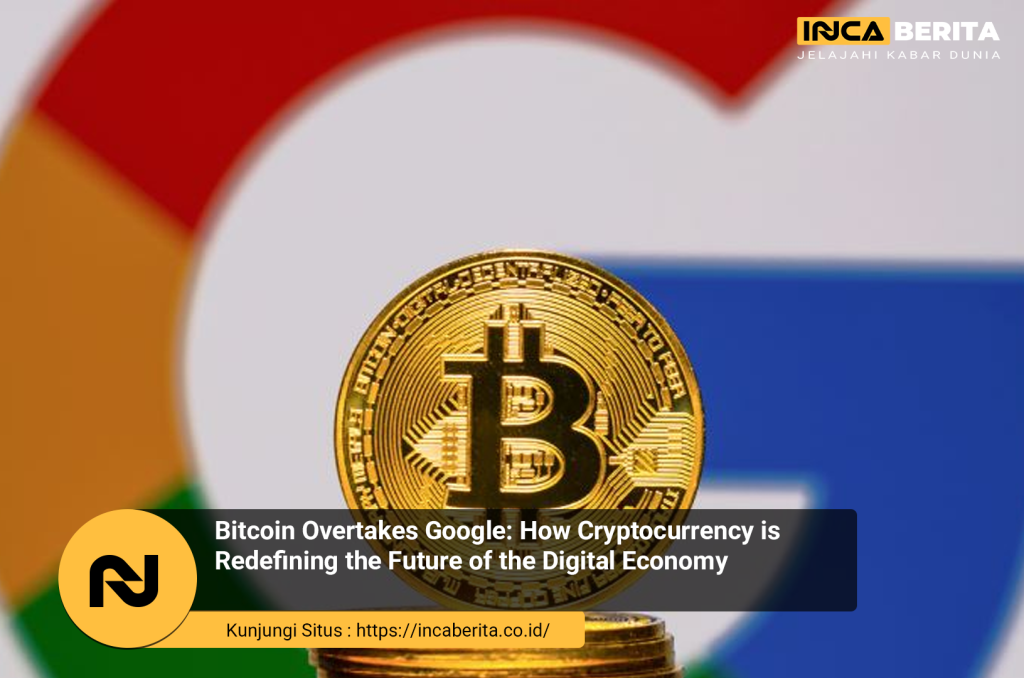Bitcoin Overtakes Google: How Cryptocurrency is Shaping the Future of the Digital Economy

You ever have one of those moments where you just sit back, stare at your screen, and think, “Wow, the world is changing way too fast”? That was me the first time I saw headlines like “Bitcoin overtakes Google.” I mean, Google’s been the king of the internet for as long as I can remember. Suddenly, this thing I used to think was just for tech geeks and shady deals—Bitcoin—was all over the news, and not just for making people rich overnight.
I’ll admit, I was skeptical at first. Cryptocurrency sounded complicated. But then, as I started digging in, I realized it’s not just about money—it’s about power, freedom, and a whole new way of thinking about value online. And honestly, I’ve made more mistakes than I care to admit. But I’ve also learned a ton, and I want to share all of that with you. Let’s get into it.
My First Encounter with Bitcoin: Confusion, Curiosity, and a Little Fear

Okay, confession time. The first time I heard about Bitcoin, I thought it was some kind of video game currency. I even ignored a friend who told me to buy some back in 2014. If I’d listened, I’d probably be writing this from a private island. But hey, hindsight’s 20/20, right?
What really drew me in wasn’t the price hype, though. It was the idea that you could send money anywhere in the world, instantly, without banks or government approval. That’s wild! No middleman, no high fees, no waiting three days for an international transfer. Just pure, unfiltered value exchange.
I remember my first Bitcoin purchase—took me hours to figure out the wallet, the addresses, and don’t get me started on the anxiety of sending my first transaction. I triple-checked the address. My hands were literally shaking. But when it went through, I felt like I’d just hacked the Matrix.
Bitcoin vs. Google: The Digital Economy Power Shift
Let’s be real—Google is everywhere. It’s how we find anything, from recipes to medical advice to, well, how to buy Bitcoin. But here’s the thing: Google controls information, while Bitcoin controls value. That’s a big shift.
I started noticing something weird around 2021. More people in my circles were talking about Bitcoin than Google. It wasn’t just tech folks, either. My cousin, who can barely use email, was asking about crypto wallets. That’s when I realized: Bitcoin isn’t just for the internet elite anymore. It’s mainstream.
Here’s a wild stat: in 2021, “Bitcoin” actually surpassed “Google” in global search interest for a brief period. That’s not just hype—that’s a sign that people are hungry for alternatives. They want control over their money, not just information.
And it’s not just about buying and selling. People are using Bitcoin to pay for stuff, send remittances, and even save for retirement. It’s like the financial system is getting a software update—and everyone’s invited.
Lessons Learned: Mistakes, Wins, and What I Wish I Knew Sooner
Let me be honest: I’ve made every rookie mistake in the book. Sent Bitcoin to the wrong address? Yup. Fell for a phishing scam? Embarrassingly, yes. Lost my wallet password? Don’t even ask.
But each screw-up taught me something. Like, always double-check addresses. Use two-factor authentication. And never, ever share your private key. Seriously, that’s like giving someone the keys to your house.
One of my biggest wins? Finally understanding how blockchain works. It’s basically a giant, public ledger that anyone can verify. No one can fake a transaction or change the past. That transparency is what sets Bitcoin apart from traditional finance. It’s trustless, but somehow, it feels more trustworthy.
And, man, the feeling of sending Bitcoin across the world in seconds? It’s addictive. I’ve helped friends in other countries, supported causes I believe in, and even bought some pretty cool stuff online. It’s not perfect—fees can spike, and the price is a rollercoaster—but it’s empowering.
How Cryptocurrency is Redefining the Future of the Digital Economy
Here’s where things get real. For years, the digital economy was all about access—access to information, services, and markets. Google was the gatekeeper. But now, with Bitcoin and other cryptocurrencies, it’s about ownership. You own your money, your data, your financial future.
I’ve seen small businesses start accepting crypto payments to avoid high credit card fees. I’ve watched freelancers get paid in Bitcoin, skipping the hassle of PayPal and bank delays. Even charities are jumping in, using blockchain to prove exactly where donations go. That level of transparency? Game-changer.
And let’s talk about DeFi (decentralized finance) for a second. I dipped my toes in last year, and wow—it’s like building a bank out of Lego bricks. You can lend, borrow, earn interest, all without a bank. It’s risky, sure, but the innovation is off the charts.
Of course, it’s not all sunshine and rainbows. The market’s wild. Regulations are confusing. And yeah, there are scams. But the potential? Massive. We’re talking about a future where anyone, anywhere, can participate in the global economy, no permission needed.
Real Talk: Frustrations and Triumphs in the Crypto World
I’d be lying if I said it’s all been easy. I’ve lost sleep over price crashes. I’ve spent hours trying to recover lost funds. And don’t get me started on explaining crypto to my parents. (“No, Mom, it’s not Monopoly money!”)
But honestly, the triumphs outweigh the frustrations. Watching my portfolio grow (and sometimes shrink), learning new tech skills, connecting with people around the world—it’s been a wild ride. And the sense of community? It’s real. Crypto Twitter, Telegram groups, even local meetups—people are passionate, helpful, and always willing to share tips.
One thing I’ve learned: don’t put all your eggs in one basket. Diversify, do your own research, and never invest more than you can afford to lose. Sounds cliché, but trust me, it’s the golden rule.
Practical Tips for Navigating the Crypto Revolution
Alright, so if you’re thinking about jumping in, here’s what I wish someone had told me:
- Start Small: Don’t go all-in on your first day. Buy a little, learn the ropes, and get comfortable with wallets and security.
- Educate Yourself: There’s a ton of free resources out there. Read whitepapers, watch YouTube tutorials, join forums. Knowledge is power.
- Stay Safe: Use hardware wallets, enable two-factor authentication, and beware of scams. If something sounds too good to be true, it probably is.
- Track Your Progress: Use apps to monitor prices, set alerts, and keep an eye on your portfolio. It’s easy to get lost in the hype.
- Join the Community: Don’t go it alone. Find friends, join groups, ask questions. The crypto world moves fast, and it helps to have people you trust.
Conclusion: The Future Is Here—And It’s Decentralized
So, has Bitcoin really overtaken Google? In some ways, yeah. It’s not about search engines vs. money—it’s about who controls the future of the internet. With cryptocurrency, we’re moving from a world of gatekeepers to a world of opportunity.
I’m still learning every day. I still make mistakes. But I wouldn’t trade this journey for anything. If you’re curious, jump in. Start small, stay smart, and enjoy the ride. The digital economy’s future is being written right now—and you can be part of it.
Bitcoin Overtakes Google—How Cryptocurrency is Redefining the Future of the Digital Economy
Let’s chat! Have you noticed how much buzz there is around Bitcoin these days? It’s wild to think that something as new as cryptocurrency could actually give Google a run for its money (pun intended). For me, the biggest change is how people talk about value online. It’s not just about information anymore—it’s about ownership and empowerment.
I’ve seen friends who never cared about finance suddenly get obsessed with blockchain. I’ve watched small businesses in my neighborhood put up “Bitcoin accepted here” signs. And yeah, I’ve had my fair share of “what the heck is going on?” moments.
But that’s what makes this space exciting. It’s messy, unpredictable, and full of potential. Sure, there are risks. But the chance to be part of something bigger—to help shape the future of the digital economy? That’s worth it.
So, what do you think? Is Bitcoin really overtaking Google, or is it just hype? How has cryptocurrency changed your view of money and the internet? Drop your thoughts below—let’s learn from each other and ride this wave together!
Read Also About: April Theory
Goal-setting is a fundamental part of personal growth, but traditional approaches can often feel rigid or overly complicated. Enter the April Theory—an innovative method for setting and achieving goals that emphasizes flexibility, creativity, and alignment with personal values. By breaking down goals into more manageable, adaptive steps, the April Theory helps individuals stay motivated and focused without the stress that typically accompanies more conventional strategies. In this post, we’ll introduce the April Theory, explain its core principles, and discuss how it can help you set and achieve meaningful goals.






